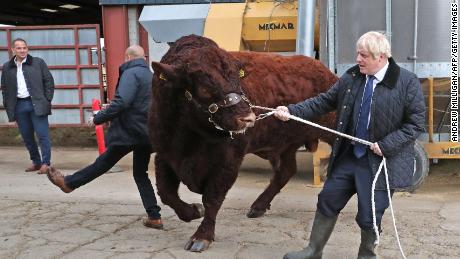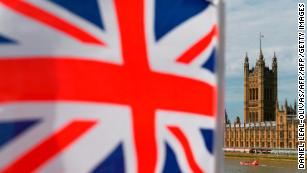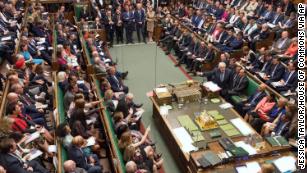Boris Johnson had a torrid week. Now he's fighting to take back control
On a visit to Scotland late last week, Boris Johnson lost control of a bull -- which duly barged into a member of his security detail.
It was an apt end to a hellish week.
The return of Parliament brought the new Prime Minister's honeymoon period to a crashing and miserable end days earlier. In the space of 72 torrid hours, Johnson lost control of the parliamentary order paper; saw his majority wiped away and his bullish Brexit strategy rebuked by lawmakers; suffered the ignominy of his own brother quitting his administration; and failed in his attempt to secure a snap general election.
The storm extended into the weekend, with Johnson critic-turned-ally-turned-critic Amber Rudd resigning from his Cabinet and accusing him of an "assault on decency and democracy" after he culled the party of 21 members.
And now, with options dwindling, Johnson is primed for another weeklong battle.
Parliament returns Monday for a high-stakes final week before a lengthy recess begins, and with plenty of pressing matters on the docket. By Friday, the course of Brexit could be clearer -- but the intervening period will be anything but calm.
Early election or another rejection?
The Prime Minister starts his week with a visit to Dublin, where he will meet his Irish counterpart Leo Varadkar. Johnson will likely talk up the state of negotiations with the European Union and the prospects of striking a deal with the bloc.
But he's remained steadfast to his commitment to secure Brexit next month, with or without a pact -- and it's the latter possibility that is causing all hell to break loose back home.
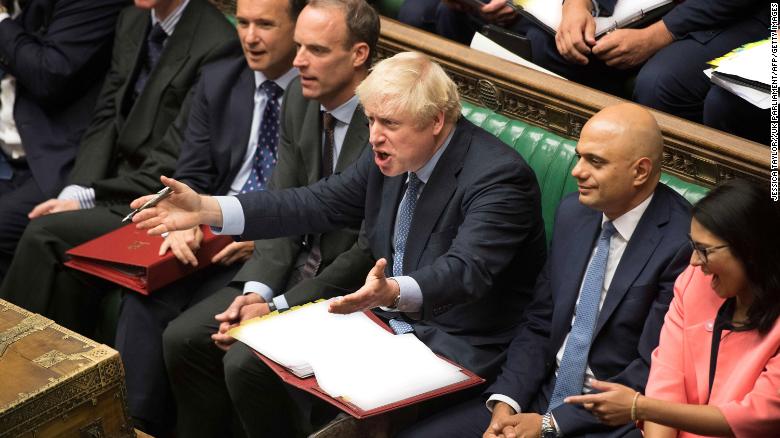
Boris Johnson during Prime Minister's Questions last week.
When he returns to that commotion later on Monday, his first task in Parliament looks doomed to fail. Johnson, who spent last week claiming he doesn't want an election, will again attempt to achieve one -- while Jeremy Corbyn, who has spent two years calling for an election, will desperately try to block it.
The UK could be heading for an early election. Here's what you need to know
Polls suggest Johnson could defeat the opposition Labour leader at the ballot box. He'd hope to return a Brexit-backing Parliament that would give him room to operate in the process, though another hung parliament is a distinct possibility.
But it appears he won't get an immediate opportunity to prove the pollsters right: Johnson needs a two-thirds majority in Parliament to secure an early election, and with the support of his party and other opposition blocs, Corbyn's blocking strategy is set to prevail.
The standoff leaves Westminster in an absurd and distorted limbo that perfectly illustrates its unending political paralysis -- and, elsewhere, things could get even more complicated.
No-deal law could prompt showdown
A bill blocking a no-deal split on October 31 is set to achieve royal assent on Monday, forcing the PM to ask Brussels for a third Brexit extension if he can't secure an agreement in the coming weeks.
That's something Johnson has said he'll never do -- he'd rather be "dead in a ditch," he said in a speech on Thursday. But in a matter of hours, it will be law.
The situation has fueled inevitable whispers: could Johnson knowingly ignore the decree, essentially breaking the law in order to take Britain out of the EU?
Boris Johnson's Brexit options
"Of course this government will obey the law," Chancellor Sajid Javid told the BBC on Sunday. But he added seconds later that Britain "will leave on October 31," and that Johnson "absolutely will not" ask for an extension in October.
It could be that the government has a cunning plan to make both ends meet -- perhaps tying the law up with legal challenges, or finding a way for Johnson to veto his own request for an extension.
But eruptions in his party, in Parliament and possibly in the courts are likely if Johnson doesn't follow the letter of the legislation -- and the backlash could begin this week, when the PM will be pressed to reveal his next steps.
Another sting in the tale, however, could come from Europe. On Sunday, the French foreign minister signaled his country would again play hardball if Britain asked for an extension -- meaning the current furore over the rebel law could all be for nothing.
A delay is not possible in the "current state of things," Jean-Yves Le Drian told French radio station Europe1.
"The British must say to us what they want," he added. "They say they want to propose other alternative solutions and arrangements... but we haven't seen them. So for us, it is no. We are not going to restart every three months."
There's turmoil in the opposition, too
If Johnson's prospects are looking bleak, things aren't much better on the other side.
Corbyn and his fellow opposition leaders have presented a rare united front in rejecting Johnson's request for an election. But that pact papers over numerous divisions among the ragtag group of moderate Conservatives and opposition lawmakers intent on stopping a no-deal Brexit.
Those splits could erupt if Corbyn calls a no confidence motion in Johnson's government this week. With the prime minister's majority deep in negative territory, it's a vote Corbyn could well win -- but the problems would start soon after, during the subsequent 14-day period for an alternative government to emerge.
What just happened in British politics and what comes next?
Exiled former Conservatives are unlikely to support any administration led by the leftist Corbyn -- a prospect they see virtually as damaging as a no-deal Brexit. But, on the cusp of power, the Labour leader would almost certainly reject calls to stand aside for a more moderate figurehead.
It's an anticipated standoff that has even led to speculation Johnson could call a vote of no confidence in his own government, confident he would survive it and expose divisions on the other side of the Commons.
That would be a remarkable move, but this young government hasn't been afraid of making bullish decisions. In one such example, it was revealed on Sunday that the Conservatives would be putting up a challenger to John Bercow, the controversial Speaker of the House of Commons, at the next election -- whenever it may be.
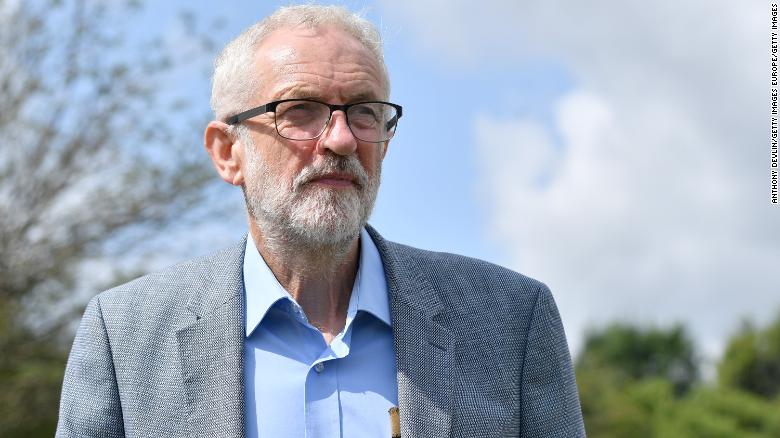
Jeremy Corbyn has blocked Johnson's efforts to call an early election.
Opposing a Speaker in his own constituency is a break from convention -- but, as Johnson's allies will point out, convention flew out of Parliament's aging, gothic windows long ago in the Brexit process under Bercow's watch as speaker.
Despite his role being historically apolitical, there is little doubt about Bercow's preference in the Brexit debate -- his likely removal after an election would deny anti-no-deal MPs a key ally, limiting their options in what could be a significantly altered Parliament.
Of course, any projections about a snap election and a new Parliament are all hypothetical -- for now.
But this much is clear: with Johnson grasping for a vote, opposition parties attempting to maintain a rickety alliance, and suggestions the PM could break the law to achieve Brexit, Westminster is set for yet another explosive week.
News Courtesy: www.cnn.com

